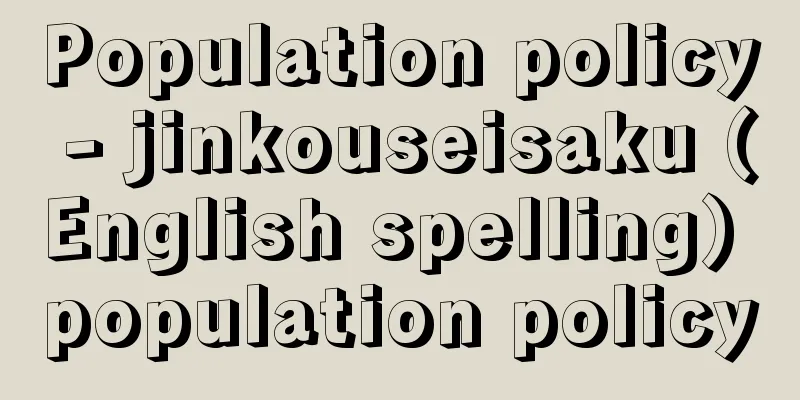Population policy - jinkouseisaku (English spelling) population policy

|
In the narrow sense, it refers to public policies intended to affect population phenomena such as births, deaths, and population movements. In the broad sense, it also refers to policies aimed at demographic phenomena caused by some kind of economic or social change, such as educational policies such as expanding school facilities for children in compulsory education in municipalities with rapidly increasing populations. Population [Toshio Kuroda] Source: Heibonsha World Encyclopedia, 2nd Edition Information |
|
狭義には,出生,死亡,人口移動のような人口現象に影響を与えることを意図した公共政策のことをいう。広義には,なんらかの経済的・社会的変化によって生じた人口現象に対する政策,たとえば人口急増市町村での義務教育児童のための学校施設増設などの文教政策などをも含めていう。人口【黒田 俊夫】
出典 株式会社平凡社世界大百科事典 第2版について 情報 |
<<: Artificial life - jinkouseimei (English spelling) artificial life
>>: Progressive muscular dystrophy
Recommend
Berlinghieri, Bonaventura
[Born] 1205/1210. Lucca [Died] 1274? Italian paint...
Virgin Birth - Shojo Kaitai
In comparative religion, it does not refer to a w...
VAR - Virtual Reality
Video assistant referee : In soccer, a referee who...
British West African National Congress - British West African National Congress
Abbreviation: NCBWA. A nationalist organization fo...
Confinement exercise - confinement exercise
Also called constrained motion. The motion of an ...
Towada [city] - Towada
A city in eastern Aomori Prefecture. It was incorp...
Resistance - Résistance (English spelling) French
Resistance is a French word meaning resistance. H...
Oracle bone inscription
These are characters carved on tortoise shells and...
Ghezo
...After the slave trade declined in the 19th cen...
Tapan
...The dance is generally a round dance called ko...
guard
〘noun〙 (guard)① To guard. To protect or defend. Al...
Wealth politics
...However, even within the Marxist anti-establis...
Liu Huan - Ryusha
544‐610 A Chinese scholar of the Sui Dynasty. His ...
Aluminum Bronze - Aluminum Seido
A Cu-Al alloy with copper as the main component a...
Ikkanryu
...His real name was Toyoda Katsugoro. He was a s...









